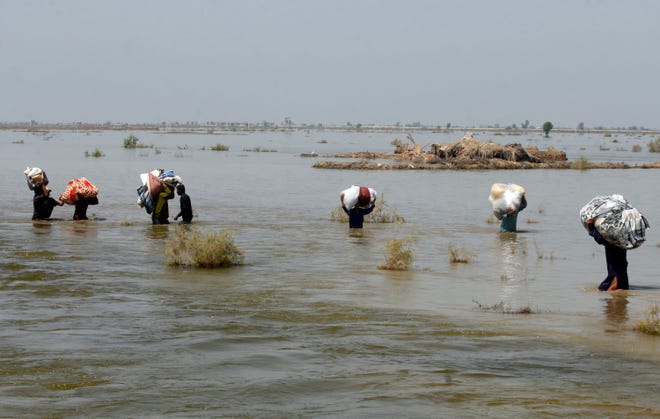- “Floods, droughts, heat waves, extreme storms and wildfires are going from bad to worse.”
- Fossil fuel emission rates are now above pre-pandemic levels after a temporary drop due to lockdowns.
- Weather-related disasters have increased fivefold over the last 50 years.
The world is “heading in the wrong direction” when it comes to climate change, according to a new report from the United Nations released Tuesday in Geneva.
Without much more ambitious action to curb greenhouse gas emissions, the physical and socioeconomic impacts of climate change will be increasingly devastating, the report, called “United in Science,” warns.
“Floods, droughts, heat waves, extreme storms and wildfires are going from bad to worse, breaking records with alarming frequency,” said U.N. Secretary-General António Guterres, in a statement. “Heat waves in Europe. Colossal floods in Pakistan. Prolonged and severe droughts in China, the Horn of Africa and the United States.
“There is nothing natural about the new scale of these disasters. They are the price of humanity’s fossil fuel addiction.”

What did the report say?
- Weather-related disasters have increased fivefold over the last 50 years and are killing 115 people per day on average – and the fallout is poised to worsen.
- Greenhouse gas concentrations continue to rise to record highs.
- Fossil fuel emission rates are now above pre-pandemic levels after a temporary drop due to lockdowns.
- The past seven years were the Earth’s warmest on record. There’s a 93% percent chance that one year in the next five will see record heat.
- There is a 48% chance that, during at least one year in the next 5 years, the annual mean temperature will temporarily be 1.5 degrees Celsius higher than the 1850-1900 average.
Report also warns of climate tipping points
As global warming increases, “tipping points” in the climate system cannot be ruled out, the report warned. Tipping points include melting of the polar ice sheets in Greenland and Antarctica and the drying of the Amazon rainforest, among others.
The U.N. report comes amid fresh warnings from scientists last week that four climate “tipping points” will likely be triggered if that temperature threshold of 1.5 degrees Celsius – set in the 2015 Paris climate accord – is passed.
“This year’s United in Science report shows climate impacts heading into uncharted territory of destruction,” Guterres said. “Yet each year we double-down on this fossil fuel addiction, even as the symptoms get rapidly worse.”
What can we do about climate change?
Many governments are already trying to address the threat of more extreme weather due to climate change, and data shows that deaths from natural disasters are down in recent years. Yet the economic cost of climate-induced catastrophes is projected to rise sharply.
The U.N. report says such “losses and damages” can be limited by timely action to prevent further warming and adapt to the temperature increases that are now inevitable. Questions around compensation for the damage that poor nations suffer as a result of emissions produced by rich countries will play a major role at the upcoming U.N. climate talks in Egypt this fall.
More:‘Triple dip’ La Niña is on the way. Here’s what it means for weather in the US
Contributing: The Associated Press




